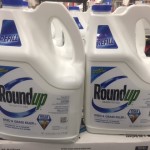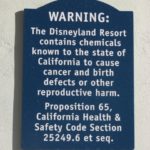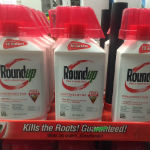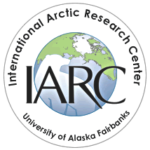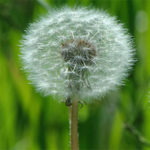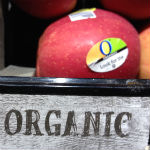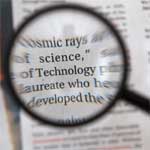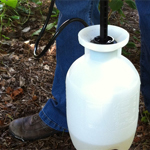"Emotions, Not Facts, are Guiding Juries against Roundup," By Angela Logomasini Ph.D. A California jury this week awarded a whopping $2 billion based on a couple's claim that glyphosate, the active ingredient in Monsanto’s weed killer known as Roundup, caused their cancers. Yet just last month, the Environmental Protection Agency reaffirmed its long-held finding that the chemical does not cause cancer. The lesson here is not that the Environmental Agency was wrong, but that sometimes the … [Read more...]
Ruling on Roundup is Good News
"Judge Tentative Ruling on Roundup is Good News for Farmers, Consumers," By Angela Logomasini, Ph.D. It’s good news for consumers that a superior court judge may put the brakes on a case alleging that the popular weed killer Roundup causes cancer. The science behind this claim — and nearly 9,000 other similar cases pending against Roundup’s manufacturer, Monsanto — is sorely lacking. If this case and others succeed, Roundup will likely be removed from the marketplace based on junk science … [Read more...]
Is Your Weed Killer Killing You?
"Is Your Weed Killer Killing You?" By Angela Logomasini, Ph.D. You might think that the popular weed killer known as Roundup is causing cancers around the world thanks to alarming news coverage of pending lawsuits. The first of thousands of such cases has now gone to trial in San Francisco, with the plaintiff claiming that Roundup caused his non-Hodgkins lymphoma. But don’t panic. While the illnesses in these cases are tragic, it is highly unlikely that they have anything to do with … [Read more...]
Study: Glyphosate Does Not Cause Cancer
"Long-term Study Finds That the Pesticide Glyphosate Does Not Cause Cancer," By Katarina Zimmer. A new study has found no conclusive link between exposure to glyphosate—the main ingredient in a popular weedkiller—and cancer. The new study, which was seen by Reuters, draws on long-term data collected through the Agricultural Health Study. This has monitored the health of nearly 90,000 people in Iowa and North Carolina from 1993 to 2010, including farmers licensed to apply pesticides to … [Read more...]
Roundup and Phony Cancer Claims
"No, California, Roundup Won't Give You Cancer," By Julie Kelly and Henry I. Miller. The chemophobes who run California are at it again, siding with environmental activists and pseudoscience rather than evidence and common sense. The state Office of Environmental Health Hazard Assessment announced last month that it was adding the weed-killer glyphosate to its list of chemicals that purportedly cause cancer. Glyphosate — sold as Roundup and under other brand names — is one of the world’s most … [Read more...]
Scrap Proposition 65
"Scrap Proposition 65, California's Unscientific Chemical Safety Law," By Angela Logomasini. California may soon list glyphosate, the active ingredient used to make Roundup weed killer, as a carcinogen under the state’s so-called “right-to-know” law, originally passed by voters in 1986 as Proposition 65. Its maker, Monsanto, says it will appeal a recent court ruling that would allow the state to proceed, but they may not be able to stop it, even though the state’s claim isn’t supported by much … [Read more...]
Glyphosate Politics
"While Unlikely To Be Carcinogenic, The Herbicide Glyphosate Is A Symptom Of A Deep Social Pathology," By Geoffrey Kabat. On both sides of the Atlantic a battle is raging between starkly opposed views of what science tells us about risks to our health emanating from our surroundings, including our food, water, and the wider environment. This battle often pits advocates, nongovernmental organizations (NGOs), politicians, and partisan scientists, who have little ability or inclination to evaluate … [Read more...]
EPA Delay on Glyphosate
Why Did the EPA Delay Its Glyphosate Safety Report? By Julie Kelly. The Environmental Protection Agency is punting a final decision on the safety of the controversial weedkiller glyphosate to the next administration. Since 2009, the agency has been conducting a registration review of glyphosate, one of the world most widely-used herbicides, and evaluating any risk to human and environmental health, an assessment required every 15 years. Read more. Save Save … [Read more...]
Glyphosate Fabrications Unraveling?
"Glyphosate: A Slow But Steady Vindication," By Alex Berezow. There has been a long history of ridiculous fearmongering by environmental activists masquerading as health experts. BPA, MSG, Alar, DDT, and food coloring are just a handful of chemicals that fell prey to overblown fears or outright fabrications. Today, the whipping boy that takes the brunt of the unfounded chemophobic assault on science is the herbicide glyphosate. Glyphosate is demonized primarily for one reason: Monsanto. To many … [Read more...]
IARC’s Questionable “Science”
"Of Questionable Evidentiary Weight' — Another Nail In IARC's Glyphosate Coffin" By Hank Campbell. It seems like a hundred years ago that the International Agency for Research on Cancer (IARC) was considered a neutral force for public good - but it was only 51. In 1965, when the Agency was created by the United Nations, there was a lot of optimism about science and the future and IARC was created to instill confidence in the public about the difference between real harm and scaremongering. Read … [Read more...]
Roundup Safety
Roundup Shown to Be Safe (Again), By Center for Accountability in Science. It’s hard to ignore the growing list of scientific authorities from around the world that keep coming to the same conclusion: glyphosate, the ingredient in herbicides such as Roundup, is safe. Recently, that list just got a little longer. That’s because New Zealand’s Environmental Protection Authority released its Review of the Evidence Relating to Glyphosate and Carcinogenicity. The new review considered studies … [Read more...]
Glyphosate Politics
"Rounding Up the Cowards: EU Leaders Block Glyphosate," By Angela Logomasini. As reported in the Wall Street Journal this week, yet another valuable pesticide product may eventually be removed from the market place. But despite the Journal’s assertion that the controversy stems from uncertain science, the real source is politics. Too many European lawmakers are afraid to take a stand that might offend environmental activists, even though inaction will raise food prices and hinder … [Read more...]
EWG Deception on Herbicide Risk
"EWG’s Latest Glyphosate Flop," By The Center for Accountability in Science. The Environmental Working Group (EWG) claims to fight for the public interest, yet rarely does so using solid science. A day after we laid out the facts on glyphosate, EWG was out in the media trying to keep people afraid of it. Claiming “a growing body of research” is linking the herbicide glyphosate (known by the brand name Round Up) to non-Hodgkin’s lymphoma, EWG failed to highlight that it really only found one … [Read more...]
EPA “Inadvertently” Admits: Glyphosate “Not Likely” a Carcinogen
"EPA (sort of) Admits: Glyphosate Not Likely Carcinogen," By The Center for Accountability in Science Team. A few days ago, the U.S. Environmental Protection Agency (EPA) published a report concluding glyphosate is unlikely carcinogenic to humans. The EPA pulled the report not long after, telling Reuters it was “because our assessment is not final”— it had been published “inadvertently.” Reuters noted, however, that the accompanying memo was labeled “Final.” The report is expected to be … [Read more...]
Glyphosate Safety Report Disappears
"EPA Magically Makes Glyphosate Safety Report Disappear," Julianna LeMieux. Glyphosate does not cause cancer … if you read about it over the weekend. That was the conclusion of a report published online by the Environmental Protection Agency on Friday, April 29, 2016, finally shutting down a 30-year debate by giving a definitive answer to a hotly contested topic. But, by Monday, May 2, it was gone. The report, “Evaluation of the Carcinogenic Potential of Glyphosate,” was published by the Cancer … [Read more...]
UK Citizens Sour About “Natural Herbicide”
"Britiots Using Salad Dressing to Kill Weeds," By Josh Bloom. True or false: It is a good idea to use a more dangerous chemical to replace a safer one? Before you answer, take a look at a couple of videos that the folks in Bristol in the UK should have watched before they decided to “go organic” and substitute vinegar (acetic acid plus water) for glyphosate — a supernaturally safe herbicide, which has been used for more than 40 years in the United States. The first shows what happens when you … [Read more...]
Scaremongering and Nonsense on Glyphosate
"Breaking Down Bullshit: How Clever Activists Make You Afraid!," By The Risk-Monger. In my last blog I stated how the organic industry lobby openly lies, spreads fear and attacks its competition – all activities that any organisation or company with an ethical code of conduct would forbid. I’d like to demonstrate how one organic lobbying organisation, USRTK, desperately needs such a code (… and a lot of integrity). As I have had quite a few personal attacks this week from people who take … [Read more...]
The Roundup on Life-Saving Weedkillers
"Glyphosate Saves Lives, Reduces Child Labor, and More," By Angela Logomasini. David Zaruk, aka the Risk Monger, has produced an excellent series of blog posts on why the herbicide glyphosate (the active ingredient in “Roundup”) is a wonderful thing, despite “cancer classifications” and demonization by greens. In a refreshingly blunt and honest series of posts, he makes some fantastic points that must shock green activists who can’t imagine why anyone would dare use a chemical to control … [Read more...]
Toxicity of Organic Pesticides
"The Risk-Monger’s Dirty Dozen – 12 Highly Toxic Pesticides Approved for Use in Organic Farming," by The Risk-Monger. It is commonly believed that organic farmers do not use pesticides and that organic food is therefore safer to consume than conventionally farmed fruit and vegetables. In a UK poll, 95% of the consumers bought organic food because they wanted to avoid consuming pesticides. This belief could not be further from the truth. The US organic industry has approved over 3000 toxic … [Read more...]
Weed Killers in Tampons
"Glyphosate in Tampons, Oh My!" By Michelle Minton. You may have seen the hilarious headlines about putting Monsanto in your vagina (if not, you’re welcome/I’m sorry). This hyperbole comes on the heels of a new study showing that the majority of cotton products tested by Argentinian researchers were found to contain glyphosate—the herbicide made by Monsanto and commercially known as Roundup. Even if you’re comfortable with farmers spraying crops with chemicals that keep away insects or … [Read more...]
Roundup Risk?
"How Dangerous is Roundup?," By Center for Accountability in Science. Earlier this year, the International Agency for Research on Cancer (IARC), an agency of the World Health Organization, classified glyphosate (the chemical used in Roundup) as a “possible human carcinogen.” While it’s certainly a scary sounding announcement, what it really means is that like working swing shifts or drinking alcohol, the IARC says studies suggest that it’s possible exposure to glyphosate might cause cancer in … [Read more...]
Reporting the Risks of Roundup
"Solid Reporting on the (Non) Risks of Roundup," By Gil Ross. Given the mainstream media’s devotion to sensationalism when discussing GMOs, it was an unexpected pleasure to come across a recent Washington Post article on the subject. The essay was entitled “It’s the chemical Monsanto depends on. How dangerous is it?” This is such an important topic/question from so many points of view that it should be essential reading for anyone who’s scientific sophistication is not up to speed — meaning … [Read more...]
Rounding Up the Facts about Pesticides in Breast Milk
"Science Trumps Hysteria When it Comes to Breast Milk and Pesticides," by American Council on Science and Health. The scientific literature has established that, when possible, breast milk offers terrific advantages to children, so it was the perfect way for anti-science groups to promote fear and doubt about a commonly used pesticide called glyphosate, which has been used by home gardeners for decades under the name Roundup. Though the U.S. Environmental Protection Agency has never found … [Read more...]
Unscientific Cancer Classifications
"The UN’s Relentless March Of Unreason," By Henry Miller. Since the 16th century, the guiding principle of the science of toxicology has been that “the dose makes the poison.” In other words, toxicology tells us what quantity (dose) of a substance will cause harm. This applies to the medicines used by Americans hundreds of millions of times a day to help relieve symptoms or treat illnesses’ for example, the right dose of aspirin or an over-the-counter cold remedy can be a therapeutic godsend, … [Read more...]
Roundup Junk Science
"If You’re Going to Pick Your Poison, at Least Choose the Right One," by American Council on Science and Health. The winner in this month’s “I need a chemistry lesson, and fast” award goes to Anthony Dunton of Acworth, Georgia. Hands down. Dunton was arrested last week for trying to poison a co-worker by putting the weed killer Roundup (glyphosate) into his water. Let’s just give him mixed grades on this one. Dunton denied trying to kill the man, but, rather, just “mess with him.” In this … [Read more...]
IARC Classification of Glyphosate
"IARC Glyphosate Cancer Review Fails on Multiple Fronts," By Academics Review. The International Agency for Research on Cancer Monograph evaluation of certain insecticides and herbicides earns an F grade for failure to consider all the available studies, placing weight on weak and discredited studies (several in the advocacy community are already using this report claiming it is a vindication of the discredited Seralini GMO cancer claims), and most importantly failure to consider if glyphosate … [Read more...]
IARC’s Ruling on Glyphosate
"IARC’s Ruling on Glyphosate Ignores the Science," by American Council on Science and Health. This month’s meeting in Lyon, France, of the International Agency for Research on Cancer (IARC) – the branch of the UN’s World Health Organization that studies the relationship between environmental and lifestyle risk factors and cancer – focused on pesticides. The committee concluded that of the five pesticides evaluated, three were “probably carcinogenic,” a 2A classification, despite the fact that … [Read more...]



